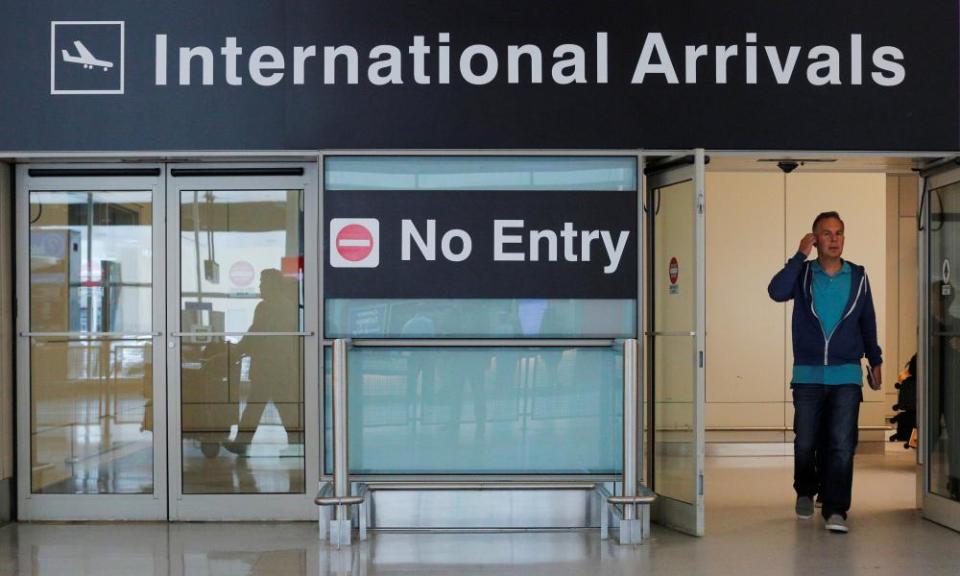Iranian cancer researcher detained at Boston airport despite valid visa
Mohsen Dehnavi, along with wife and three children, may be sent home, Boston children’s hospital says, two weeks after Trump’s travel ban took force

An Iranian cancer researcher traveling to the US on a valid visa has been detained at Boston Logan international airport with his wife and three children, two weeks after Donald Trump’s revised travel ban came into force.
Mohsen Dehnavi was traveling to the US to work as a visiting scholar at Boston children’s hospital, which is affiliated with Harvard Medical School. But when he arrived on Monday afternoon, he was not allowed to enter the country and may now be sent home along with his family, according to a friend who was due to pick them up from the airport.
“An Iranian Harvard postdoc came to the Boston Logan airport today with his family. Now after 10h in the airport, the officer is telling me that they will not let them in and they need to go back to home (Iran),” Dehnavi’s friend, Mohammad Rashidian, wrote on Facebook.
Stat news, which is affiliated with the Boston Globe, quoted Rashidian as saying that Dehnavi and his family “were so worried”.
“I don’t really know what the source of the problem is,” he said.
In an emailed statement, Boston children’s hospital said Dehnavi was traveling on a J-1 visa, a non-immigrant visa issued to highly skilled research scholars, professors and exchange visitors.
“Dr Dehnavi is a visiting research scholar on a J-1 visa coming to Boston Children’s with his wife and three children,” read the statement. “He and his family are being detained at Logan [and] are supposed to be sent back to Iran later today.”
It added: “Boston Children’s has limited information at this time about the circumstances of the detention. Boston Children’s hopes that this situation will be quickly resolved and Dr Dehnavi and his family will be released and allowed to enter the US. The hospital is committed to doing its utmost to support Dr Dehnavi and his family.”
Trita Parsi, the president of the National Iranian American Council (NIAC), whose organization has vehemently opposed the ban, expressed dismay at Dehnavi’s detention, posting an image of his visa on Twitter, which shows it was issued in May and is valid until August.
It shows that Dehnavi has already been through administrative processing (essential clearance from security agencies) before the visa was issued. “Clearance received 12 April 2017”, the visa shows.
What #MuslimBan is doing RIGHT NOW. Harvard researcher at Children's hospital (+3 kids) WITH VALID VISA about to be deported @BostonLogan pic.twitter.com/r1oN9Ac7Ca
— Trita Parsi (@tparsi) July 11, 2017
Late June, the US supreme court lifted significant elements of lower court orders blocking Trump’s executive order banning entry to the US for people from six Muslim-majority countries.
Nationals from Iran, Libya, Somalia, Sudan, Syria and Yemen are banned from entering the US if they fail to show a credible “bona fide relationship” with a person or entity in the US.
“Despite the court rulings, clearly the spirit of the Muslim ban has survived,” Parsi told the Guardian. “Visas to Iranians have already dropped more than 52% compared to last year, as a result of the Trump administration implementing the ban despite the injunctions from the courts. Much indicates now that unless Congress takes action, the ban will remain in place and continue to discriminate and tear families apart while doing nothing to make America safer.”
Most Iranians who fall victim to Trump’s order are highly educated students and scholars. A number of Iranian scientists, including those studying at Harvard, were affected when the original ban came to force before being blocked by courts.
Elmira Jalilian and Saghi Saghazedhi, who work at Harvard’s Tissue Engineering Lab, were among scores of Iranian scientists protesting against the ban. “The visa has never been easy for Iranians,” Saghazadeh told PRI in February. “Is this just a direct way of saying, ‘Leave our country’?”
Samira Asgari, a Harvard Medical School lab scientist who is an Iranian national, was among people who sued the Trump administration over the original ban.

